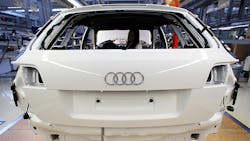Audi AG, the luxury-car manufacturer that’s Volkswagen AG’s largest earnings contributor, expects the fallout from rigged diesel-engine emissions systems to continue to weigh on the company this year.
Rules were broken and “ethical boundaries have been transgressed,” Audi CEO Rupert Stadler said Thursday in the text of a speech for the annual shareholders meeting in the division’s home city of Ingolstadt, Germany. “The burden resulting from the diesel issue has not been relieved.”
This adds to other challenges this year that include intensifying competition in China, volatile currencies and woes in the European Union, such as the refugee crisis and the possible departure of the U.K. from the bloc, he said. Even so, Audi is sticking to plans to increase sales and generate operating profit in a range of 8% and 10% of revenue.
Earnings from Audi are critical for Volkswagen to weather the emissions-cheating scandal. Europe’s biggest carmaker is facing billions of euros in costs triggered by its admission eight months ago to manipulating millions of diesel-powered cars to pass emissions tests. As part of the fallout from the scandal, Audi will recall about 2.3 million cars, about a fifth of the total affected worldwide. The upscale brand was also responsible for developing one of the engines that U.S. authorities say breach emission rules.
About 90% of the Audi vehicles with rigged emissions-control systems are equipped with 2-liter engines, which require only a software update to comply with regulations. Hardware and software fixes will be needed for cars with the 1.6-liter motor variant. The division will complete a European recall of 4-cylinder models this year as part of its work to “put things right,” Stadler said.
While the VW brand will foot the bill for the smaller cars, Audi has agreed to pay for repairing about 85,000 autos in the U.S. powered by a larger, 3-liter V6 diesel engine, including VW Touareg and Porsche Cayenne sport utility vehicles. Audi itself accounts for about 13,000 of those cars. Audi also agreed to update the software of 60,000 cars with 3-liter V6 diesel engines in Europe as part of a wider voluntary recall together with other manufacturers “to dispel the last doubts of the investigative commission,” Stadler said.
Audi’s operating profit fell 6.1% last year to 4.84 billion euros ($5.51 billion), burdened by 228 million euros ($259.68 million) in expenses for resolving the scandal, as well as costs for developing electric-vehicle technology and expanding its global manufacturing network. The unit also set aside 70 million euros ($79.73 million) last year for fixing faulty air bags supplied by Takata Corp.
After dropping to third place behind BMW and Mercedes-Benz in global luxury-car sales last year, Audi is seeking to gain ground on the two German rivals with a new version of the best-selling A4 sedan and wagon as well as upgraded SUVs including the flagship Q7 and the smaller, all-new Q2. Audi will introduce 20 new or revised vehicles in 2016 and targets a “moderate increase” in deliveries.
Audi shares are listed but outside investors have hardly any influence as parent VW controls 99.6% of the stock. External shareholders usually receive a so-called compensatory payment that’s tied to the dividend of Volkswagen ordinary shares. Audi paid 4.80 euros ($5.47) per share for 2014. VW has proposed paying shareholders a dividend of 11 euro cents (13 cents) per common share for last year. The vote is scheduled at VW’s annual meeting, which has been delayed to June 22.
By Christoph Rauwald
About the Author
Bloomberg
Licensed content from Bloomberg, copyright 2016.
